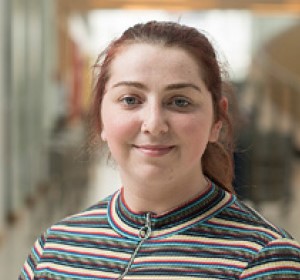Earth Sciences
BSc (Hons) (NFQ Level 8)

Course Video
Curricular information is subject to change.
Open AllEarth Sciences are all about our planet and how it works: at no time has this been more important. Understanding the Earth system profoundly impacts many aspects of society and is critical to developing solutions for current global challenges, including climate change, energy, access to clean water and protection from natural disasters. Our degree builds on biology, chemistry, physics and physical geography to understand the structure, age and evolution of the Earth, the history of life, and the processes (e.g. plate tectonics, earthquakes, landslides) that shape Earth’s surface and interior. Modules equip graduates with modern field, digital and geospatial skills, and there is an emphasis on developing critical thinking based on earth system data, on scales ranging from microns to thousands of kilometers.
Earth Sciences is one of the degree subjects available through the Earth & Environmental Sciences stream in the common entry Science course.
Students interested in Earth Sciences have the choice in first year to study the modules for Earth Sciences and Environmental Biology or to focus on Earth Sciences only. At the end of second year, students choose their degree major. Assuming students meet all the academic requirements in first and second year, students are guaranteed a degree subject from the stream they are studying in second year. We do our best to ensure that students go on to study their top degree subject choice. As we offer plenty of degree subjects in each stream, students have a number of similar degree subjects to choose from as their degree major. This is a sample set of modules that an Earth Sciences student could study each year in UCD.
First Year
- Scientific Enquiry
- Introduction to Earth Sciences
- Earth Science & Materials
- Earth & Humanity
- Field Geology
- Earth, Environment & Society
- Optional Science Modules
- Elective Module
Second Year
- Crystals to Sedimentary Rocks
- Field Geology & Mapwork (Includes a residential field course in the west of Ireland)
- Geoscience for Sustainability
- Earth & Humanity
- Global Environmental Change
- Medical Geology
- Earth, Environment and Society
- History of life on Earth
- Dynamic Earth
- Optional Modules
- Elective Modules
Third Year
- Applied Palaeontology
- Sedimentary Environments
- Igneous Petrology
- Geological Mapping
- Geological Structures
- Metamorphic Petrolog
- Geological Fieldwork (Residential field courses in Ireland and England)
- Low Temperature Geochemistry
- Geomaterials & Geoenergy
- Digital Geology & GIS
- Optional Modules
- Elective Modules
Work Placements & Research Opportunities
Students have the opportunity to take a work placement module and/or a research project module during Third Year or during the following summer vacation.
Fourth Year
- Geological Mapping Research
- Applied Palaeontology
- Igneous & Ore Geology
- Advanced Geological Mapping
- Basin Analysis
- Geological Fieldwork (Includes a 10-day residential field course, usually held in Spain)
- Quaternary Geology
- Applied Geophysics
Earth Sciences as a Minor Subject
Earth Sciences can be combined with either Archaeology or Geography as a Minor subject, with most of your study being in your Archaeology or Geography Major subject through DN700 Social Sciences. Depending on your interests, you may elect to study from the following range of themes: Geology and Society; Landforms, Sediments and Life; Field Skills; Geochemistry; Earth Materials; Solid Earth Evolution. To select Earth Sciences as a Minor, select DN700 Social Sciences, choose the Two Subject Combination, then select either Archaeology or Geography with Minor subject – and pick Earth Sciences.
Earth Sciences graduates work in organisations essential to understanding and protecting the environment including geological surveys, NGOs, onshore and offshore geotechnical companies, environmental consultancies and insurance firms managing natural disaster risk.
They are also employed in companies exploring for, and producing, natural resources as mineral exploration and production geologists, geophysicists, hydrogeologists, environmental geochemists and marine surveyors.
“Earth Sciences is such a diverse and exciting field of study. The creation and destruction of the Earth beneath our feet, strange creatures preserved in rock and ancient catastrophic events are among a few of the things I find fascinating about it. I was always interested in Science but found it very difficult to pinpoint a specific area within it to study. UCD Science became a clear first choice for me because of the common entry system, and it was through this course that I discovered my love of Earth Sciences. I am now working as a project coordinator in the Offshore Wind Industry. Working in an industry that is constantly taking strives towards a greener future for Ireland is so exciting.”
Grace Fitzgerald, Graduate
Sarah Procter
UCD School of Earth Sciences
Belfield, Dublin 4
Email: askscience@ucd.ie


